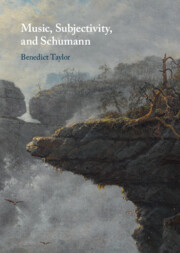Book contents
- Music, Subjectivity, and Schumann
- Music, Subjectivity, and Schumann
- Copyright page
- Contents
- Examples
- Acknowledgements
- Abbreviations
- Preamble
- Prosopopoeic Preliminaries
- Part I Hearing Subjects
- Part II Hearing Presence
- 4 Presence of the Self
- 5 Presence of the Other
- Part III Hearing Absence
- Part IV Hearing Others
- Epilogue
- Bibliography
- Index
5 - Presence of the Other
from Part II - Hearing Presence
Published online by Cambridge University Press: 07 April 2022
- Music, Subjectivity, and Schumann
- Music, Subjectivity, and Schumann
- Copyright page
- Contents
- Examples
- Acknowledgements
- Abbreviations
- Preamble
- Prosopopoeic Preliminaries
- Part I Hearing Subjects
- Part II Hearing Presence
- 4 Presence of the Self
- 5 Presence of the Other
- Part III Hearing Absence
- Part IV Hearing Others
- Epilogue
- Bibliography
- Index
Summary
In Chapter 5, ‘Presence of the Other’, the implicit subject / object split reintroduced into the musical subject by the need for its own self-recognition finds a potential solution in the presence of an other in whom the self may see itself mirrored. Indeed, Schumann’s writing and music suggest a blurring of identities and fusion of self and other that resonates strongly with the Romantic mythology of hermaphroditic union, as seen in the 1841 song collection Liebesfrühling jointly written with Clara. Through this mirroring and recognition of self in other, Schumann’s music may in certain cases be claimed to achieve a state of self-conscious awareness, to ‘hear itself singing’. Yet, as pointed to at the chapter’s close, such doubling of self and other always runs the risk of narcissism – the idea that the beloved object is merely a self-image, a fabrication of the subject’s desire.
Keywords
- Type
- Chapter
- Information
- Music, Subjectivity, and Schumann , pp. 155 - 188Publisher: Cambridge University PressPrint publication year: 2022

